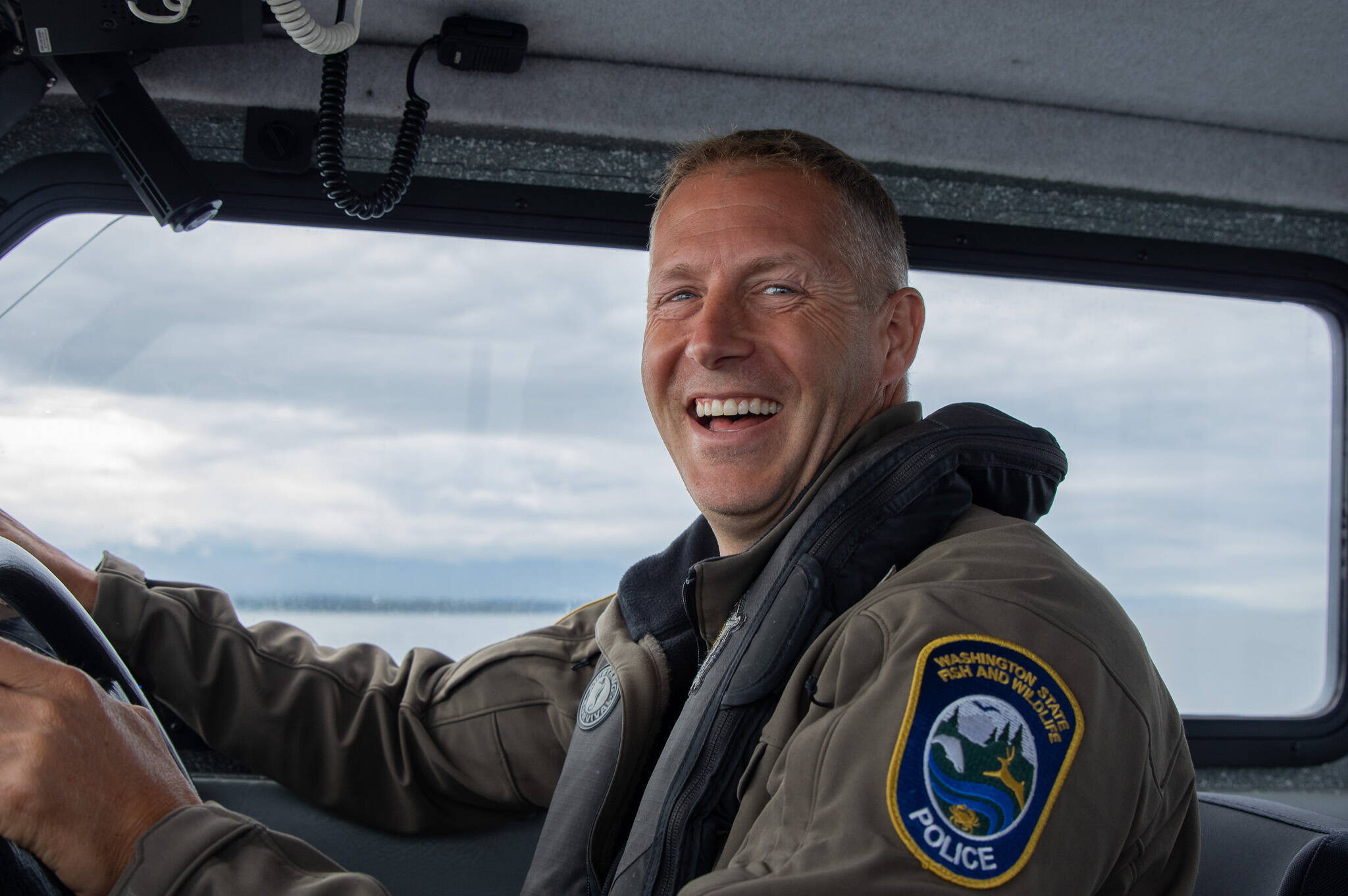Each day on the water is a different combination of weather, earth rotation, human and animal activity and other variables.
The day that the two Region 6 Washington state Fish and Wildlife (WDFW) police take me out to catch a snapshot of their jobs is overcast with glorious reflections on the water; the temperature is perfect for long sleeves and all the fishermen we encounter seemed happy.
Sergeant Matt Jewett drives the boat. Outside the little cabin in the open stern, Lieutenant Kit Rosenberger scans his surroundings with binoculars, alert for anomalous behavior, whales and everything else the WDFW police need to keep an eye on.
We see orcas — a trio of transients that I am told, both by the police and the overseers at the Port Angeles marina, have been seen in the area often lately.
We are not the only ones who are thrilled by their presence. In addition to the fishermen and people using boats for business, we share the water with at least three whale watching vessels.
“WDFW officers are the primary law enforcement in Washington for the protection of Southern Resident Killer Whales,” Rosenberger writes later.
The laws are slightly stricter for being in the presence of Southern Residents than transient orcas. Rosenberger tells me that boats must give the residents at minimum 300 yards on either side and 400 yards in front of and behind them and must avoid approaching Southern Resident killer whales within 1,000 yards.
Boats should reduce their speed to 7 knots within one-half nautical mile of them.
“Several days a week in the busy summer months WDFW officers from around Puget Sound participate in dedicated ‘whale patrols’ days where we search out orcas and ensure that boaters are keeping the proper distance away and speeds while in proximity of whales,” Rosenberger writes. “WDFW Officers also regulate the commercial whale watching industry.”
Rosenberger and Jewett tell me that the local whale watching boats are respectful of the laws.
A bait ball is surrounded by seagulls of mixed type, alternating from swirling above in group alarm, settling onto the water and attempting to catch fish. Their superiority of numbers makes the other birds utilizing the bait ball indistinct.
In the summertime the officers are out on the water a lot, they say, but now in early fall things slow down a bit.
Jewett said that his childhood mentor was a Fish and Wildlife officer names Bruce Richards, who first was his baseball coach in elementary school. He said Richards gave presentations at camps and invited students for ride-alongs.
“I, along with others in the community, were constantly invited to participate in unique problem wildlife calls with him to include elk, deer, cougars, bear, mountain goat capture,” Jewett says.
“He was highly involved in the community through both his personal and work life promoting Washington’s outdoors and wildlife that we are so lucky to have. When I was about 12-13 years old, I really started to notice how much Bruce loved his job and decided that I also wanted to be a ‘game warden.’”
All part of the job
Like days on the water, each day as a DFW policeman is unique, which is one of the many reasons Jewett says, “We’ve got the best job on earth.”
“As long as we work 171 hours in 28 days, we get to pick when and where we work,” Rosenberger says.
“We can adjust it according to circumstances,” Jewett explains. “It keeps the poachers on their toes,” he adds, with a grin.
Jewett says that he likes the big, exciting jobs like tracking down cougar poachers, but the two officers agree that keeping an eye on fish habitat is likely their most important duty.
Later, Rosenberger explains, “Arguably the most important part of a WDFW officer’s job is protecting fish habitat. Illegal hydraulic projects where streams are diverted, fish passage blocked, or the construction of unpermitted bulkheads along the marine shoreline have a grave consequence to fish life.
“Impacts to fish habitat do not just damage salmon and steelhead populations, but the entire food web, forage fish who feed salmon and seabirds, wetland creatures of all kinds, all the way up to hungry orca whales. Working illegal hydraulic project cases may not be the most headline grabbing or glorified aspect of a Fish and Wildlife officers job but is very well one of the most important parts.”
The pinks are on their way up the Dungeness River, and the WDFW officers say that in odd years they are more plentiful; we talk a bit about people who put out illegal nets, businesses that have been caught selling dirty shellfish and divers that steal geoducks deep under the water.
These are some of the watery situations that WDFW police have to deal with at times, but today there is no nefarious activity evident in the Strait of Juan de Fuca, just the happy fishermen who smile and shout back a greeting when the boat with its soft bumpers — the air collar — pulls up beside them and Rosenberger or Jewett call out, “Good morning, Fish and Wildlife!”
Jewett firmly holds the boats together as Rosenberger calmly asks questions of an anonymous fisherman, who is proud to show the salmon he and his friend just hauled in.
“Our job is mostly proactive law enforcement, compliance checking,” such as visiting with fishermen, checking their catch card and their coolers to make sure they match up, Rosenberger says. “Other times we’re reactive, in the moment.”
Says Jewett, “Most people are good to go, or there is a genuine, honest mistake.”
For more about Washington’s Department of Fish and Wildlife, visit wdfw.wa.gov.



